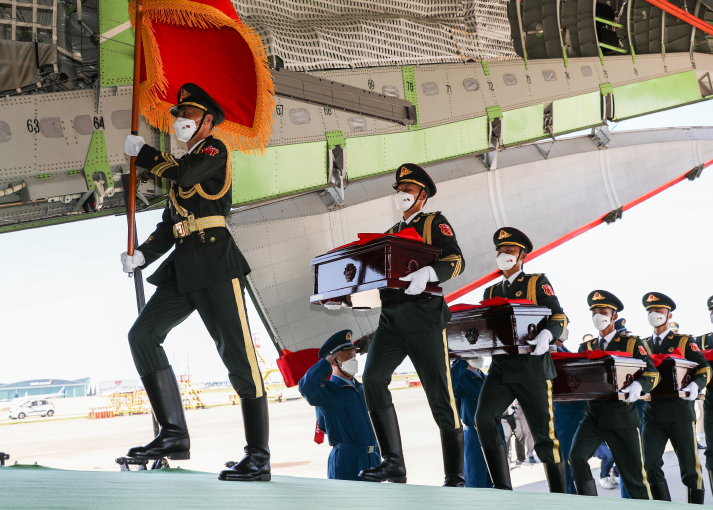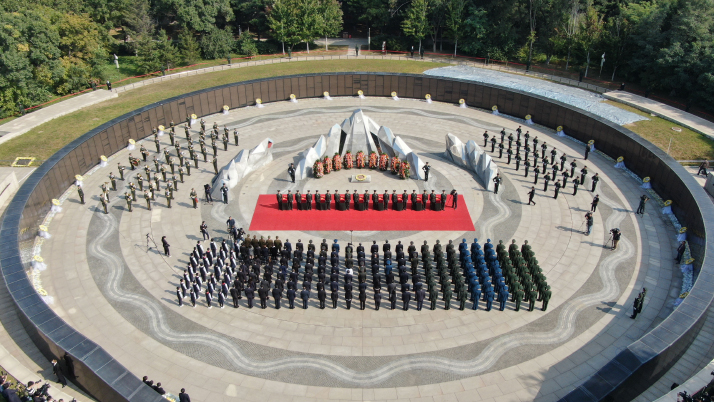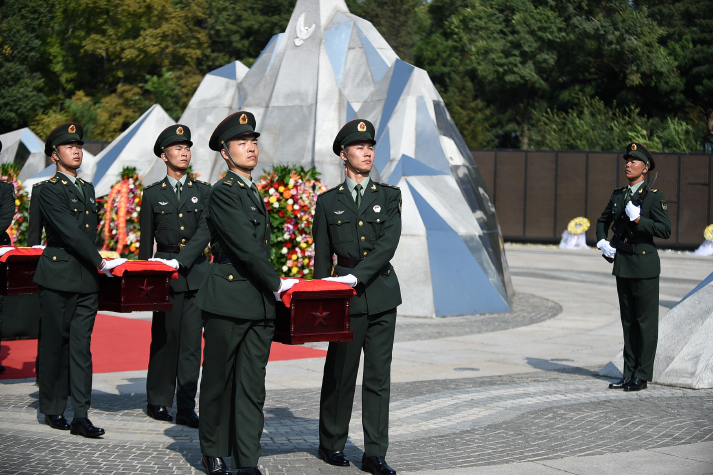| China |
| Remains of volunteer soldiers returned from the ROK | |
|
|
 Chinese soldiers carry the remains of martyrs to a plane at the Incheon International Airport, Seoul, on September 27 (XINHUA)
It was a sunny morning in Shenyang, capital of Liaoning Province in northeast China, on September 27. Soldiers of the People's Liberation Army (PLA) rehearsed for a special event at the airport—to welcome the "return" of the Chinese martyrs from the Republic of Korea (ROK) long after the War to Resist U.S. Aggression and Aid Korea (1950-53).
One day before that, the remains of the 117 martyrs were casketed in the ROK. It was the seventh batch of martyrs' remains handed over according to an agreement signed by the two countries in 2013. Between 2014 and 2019, the remains of 599 soldiers were brought back to China. Unlike the previous six years when the handover was organized before the Tomb Sweeping Festival, which falls in early April, this year, it was postponed to September due to the novel coronavirus disease (COVID-19) pandemic. But it was still managed before September 30, China's Martyrs' Day. It was also the first time the Y-20 aircraft, the largest and most advanced domestically developed transport aircraft, had been used to carry out the task. The serial number of the plane, 01, indicated high respect for the martyrs. Previously, the Russian-made Ilyushin-76 was used.  A funeral is held in Shenyang, Liaoning Province on September 28 for 117 Chinese volunteer soldiers whose remains were returned to China from the Republic of Korea on the previous day (XINHUA)
Long separation In the early 1950s, at the request of the Democratic People's Republic of Korea (DPRK), Chinese People's Volunteers (CPV), totaling 2.9 million, crossed the Yalu River, the border between China and the DPRK, and fought alongside the DPRK army against the ROK army and U.S.-led "UN forces." Despite their less-developed weapons, the Chinese soldiers eventually drove the U.S. army back to the 38th Parallel in 1953. For decades, China had been seeking to bring their remains home. It was not until 2013 that China and the ROK settled this issue. On September 27, the plane carrying the remains arrived at the Taoxian International Airport in Shenyang. A ceremony was carefully designed to show respect to the martyrs. Two fire engines sprayed water to form an arch over the plane, implying "washing all the dust off from the trip." Chinese Vice Premier Sun Chunlan spoke at the ceremony, saying this year marks the 70th anniversary of the CPV's participation in the war. The Chinese have always kept in mind the feats of the CPV in safeguarding justice and opposing aggression. She also called for cherishing the hard-won peace, following the path of peaceful development, striving for the rejuvenation of the Chinese nation and making greater contributions to safeguarding world peace and promoting common development. "Why did we win the war? It was because our brave soldiers were not afraid of making sacrifices, and we fought for justice and peace," said 89-year-old CPV veteran Wang Liping, who was present at the airport. Liu Bo, a professor at the China PLA National Defense University, interviewed some CPV veterans. He recalled that during an interview with a veteran, a young student in his team asked, "Did you ever think your mother would be very sad if you died in the war?" She replied, "My mother would only have been proud of me. We never thought of coming back. Every soldier was ready to sacrifice his or her life." Wang Guobin, a 92-year-old CPV veteran who also spoke at the ceremony at the airport, remembers clearly the date he set off for the war—October 19, 1950. He was relieved to see the martyrs finally come back to the motherland. Yet he also cried because this return took about 70 years. "They must be proud to see the development of China," Wang said. "Hope they rest in peace in the motherland." Zhu Jiangbo, whose father died in the war, also went to the airport and attended the ceremony. "I don't know whether my father's remains are there but seeing the remains of these soldiers return is like seeing my father," Zhu said.  Soldiers escort caskets containing remains of Chinese soldiers killed in the Korean War (1950-53) at the Chinese People's Volunteers martyrs' cemetery in Shenyang, Liaoning Province on September 28 (XINHUA)
Hero, a shared name "Many CPV soldiers were under 20 years when they died in the war so they did not have any children," Chen Qiubo from the Academy of Military Sciences of the PLA, who has worked on recording the names of the martyrs in the war, told China Central Television (CCTV). "This has increased difficulties in finding their relatives." Information about the martyrs was recorded to the extent possible, including their full names, ranks, and the time they joined the army and died. The names can be found on a memorial wall at the CPV martyrs' cemetery in Shenyang, which was built in 1951. This time, personal seals of three martyrs were found, providing clues for confirming their identities and finding their relatives. Within hours of the launch of a nationwide hunt, their families were found. The three were born in the 1920s and died when they were in their 20s. Cemetery staff have registered the items returned in electronic files. The caskets were taken to the Shenyang CPV martyrs' cemetery. Many local residents lined the roads to show their respect. A senior couple from Jinzhou, another city in Liaoning, traveled to Shenyang specifically for this event. "A soldier from my hometown in Jinzhou died in the war," the woman told CCTV. "I heard about it when I was a kid. I just know his surname is Dong and don't know whether his remains have already been returned. We will never forget how they fought to safeguard peace." On September 28, a funeral was held at the martyrs' cemetery, amidst wreaths of yellow and white chrysanthemums. "May the martyrs rest in peace and their fighting spirit be forever remembered," Sun Shaocheng, Minister of Veterans Affairs, said at the ceremony. He called on compatriots to inherit the spirit of the martyrs and contribute to the rejuvenation of the Chinese nation. Shu Jun, a student from Beijing-based Renmin University of China, watched the live-streaming of the ceremony online. "We will keep them in mind," Shu said. (Print Edition Title: Homecoming At Last) Copyedited by Madhusudan Chaubey Comments to yuanyuan@bjreview.com |
|
||||||||||||||||||||||||||||||
|